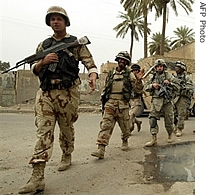2007年VOA标准英语-Study: US Troops Stressed by Iraq Deployments(在线收听)
Washington
07 May 2007
 |
| US and Iraqi Army soldiers patrol an area in Baghdad's al-Karrada neighborhood (file) |
The study found that long and repeated deployments in Iraq are increasing the mental health problems of U.S. troops. The survey, conducted by the Mental Health Advisory Team from the United Stated Department of Defense, is the fourth since the war began in 2003. The report's multiple findings were presented Friday at the Pentagon by the Army's Acting Surgeon General Gale Pollock and a team of experts.
"Not all soldiers and marines deployed to Iraq are at equal risk for screening positive for a mental health symptom,” said the general. “The level of combat is the main determinant of a soldier's or a marine's mental health status."
The study involved more than 1300 soldiers and 450 Marines primarily in units with the highest levels of combat exposure and stress. The issues ranged from battlefield ethics, to torture, suicide and family concerns.And most of the findings pointed to post traumatic stress disorder, high levels of anxiety, and depression.
General Pollock said, "Multiple deployers [troops who have been sent to battle zones more than once] reported higher acute stress than first time deployers, and deployment length was related to higher rates of mental health concerns and marital problems. Marital concerns were higher than in previous surveys and these concerns were related to the deployment lengths.
The study also found that soldiers experience mental health problems at a higher rate than Marines. General Pollock believes that is because Army deployments are several months longer than those of Marines. The researchers went on to say that time at home is important to the mental recovery of the troops.
There is concern among some mental health professionals that President Bush's plans to extend the deployment of soldiers in Iraq could lead to even greater mental health problems for members of the military. General Pollock addressed this issue, echoing calls by Army Chief of Staff George Casey for a larger force. "That the Army is spread very thin and we needed to be a larger force for the number of missions that we were being ask to address for our nation."
The report also examined battlefield ethics, something the three previous studies did not focus on. The study group issued a series of recommendations relating to ethics as well as suicide prevention and behavioral health awareness.